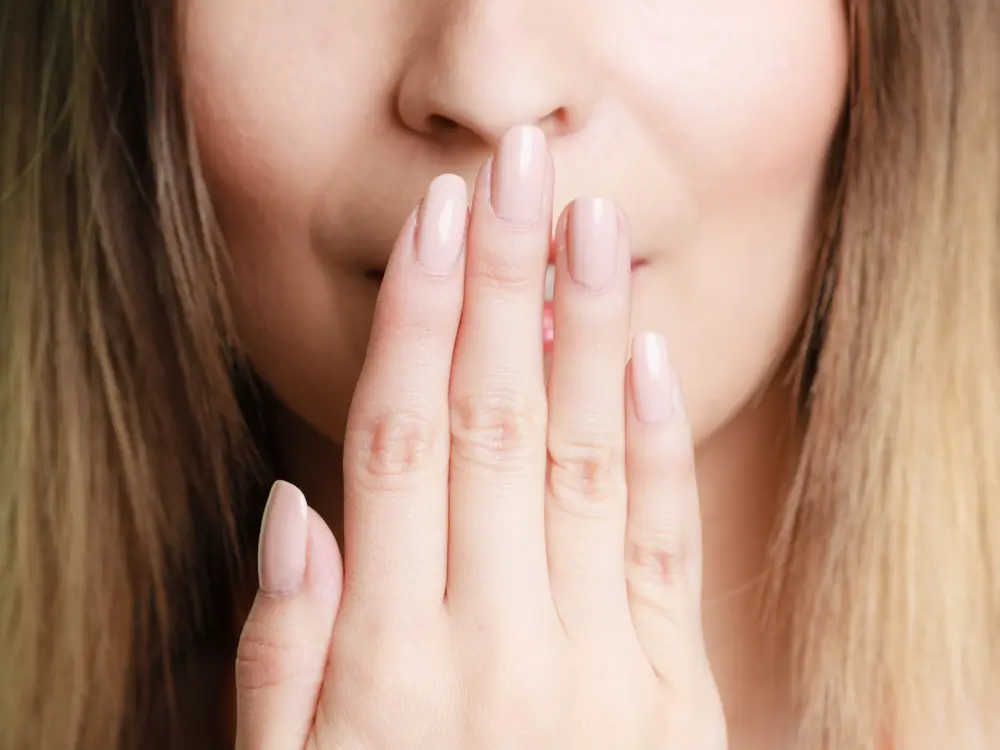What causes halitosis and what can you do?
Bad breath (or “halitosis” to use its medical name) is a common and embarrassing symptom- it can be stressful in social situations, and may even affect a person’s self-confidence. Some people may have bad breath but be entirely unaware of it. Others may worry they have it when they don’t! It’s hard to accurately check yourself for halitosis- so if you have concerns, it’s worth asking a straight-talking friend or family member to tell you if you’ve got a problem or not. Or you can ask your dentist or doctor to check.
What are the causes of bad breath?
Anyone can get halitosis from eating strongly flavoured foods (such as onions, garlic or strong spices), smoking or drinking alcohol. And most of us have experienced “dog breath” in the morning, which tends to settle once you have something to eat or drink, and fresh saliva is produced which cleanses your mouth. These types of bad breath are common but temporary. However, ongoing halitosis can be a sign of an underlying health problem- in this case it may be worth speaking to a doctor or dentist for advice.
Causes of bad breath (halitosis)
Bad breath that comes from the mouth
Most halitosis comes from problems in the mouth. Bacteria on the gums, tongue and between the teeth can lead to release of smelly odours. Trapped food particles between the teeth can cause bacteria to multiply in greater numbers. A good oral hygiene regime can help, including regular brushing of the teeth, tongue and gums, flossing between the teeth, and rinsing the mouth with antiseptic mouthwash.
Tonsil stones, also known as tonsilloliths, are hard particles that form in the small hollows on the surface of the tonsils. They can be made of a mixture of calcium, magnesium and phosphorus and show up as small pale lumps which are hard to remove. They can smell very unpleasant indeed.
Acid reflux
Some people report that acid reflux (when acid regurgitates from the stomach up to the mouth) can cause their breath to smell unpleasant. Also, the presence of certain bacteria in the stomach (Helicobacter Pylori), seems to be associated with bad breath.
Respiratory problems
If a person has long term sinus infections, or a constant drip of mucus down that back of the throat (a postnasal drip), this may lead to bad breath. Now and then a child might get halitosis from pushing a foreign body in the nose when nobody is watching- the first symptom that they have been up to mischief may be an unpleasant odour from the nose and mouth! Bad breath can be caused by certain lung conditions where there is build-up of infected mucus or sputum, such as bronchiectasis.
Other chronic diseases
If a person has significant liver or kidney disease, it can lead to bad breath, but in these cases there will usually be other more obvious symptoms. Untreated Type 1 Diabetes can also cause a strong chemical odour on the breath, which people say is a bit like nail varnish. If a person is dieting or malnourished, they may develop a similar type of breath, caused by high ketones in the bloodstream.
In addition, any condition that leads to a dry mouth can predispose a person to halitosis- including sleep apnoea, or uncommon conditions that result in too little saliva being produced, such as Sjogren’s disease.
What’s the best advice for someone with bad breath/halitosis?
- Find out if you really have a problem (ask someone to check your breath!)
- Avoid smoking, avoid strong smelling foods and reduce alcohol intake
- Stay well hydrated
- Carefully brush your teeth, tongue and gums twice a day- remembering to floss, and use mouthwash. Speak to your dentist if you think your gums or teeth are not in good shape.
- Consider whether you may have symptoms of acid reflux, sinus problems, tonsil stones or other health issues mentioned above, and speak to your GP
- If these measures don’t help or you’re worried about any of the causes of bad breath discussed in this article, you should see your doctor for an examination and appropriate investigations.
Getting a Mental Health Care Plan in Australia: Your Guide
Getting a Mental Health Care Plan in Australia: Your Guide Mental health matters—and if you’re feeling overwhelmed, anxious, or down, a mental health care plan can help. But what is it, and how do [...]
UTI Symptoms and Treatment: What You Need to Know
UTI Symptoms and Treatment: What You Need to Know Urinary Tract Infections (UTIs) are common, uncomfortable, and often disruptive. But what exactly are the signs to watch for, and how can you get relief [...]
Free Mental Health Care Plan Online | Bulk-Billed by Qoctor
Free Mental Health Care Plan Online | Bulk-Billed by Qoctor Discover how to get a free, bulk-billed Mental Health Care Plan (MHCP) in Australia through Qoctor's telehealth service. Accessing [...]






